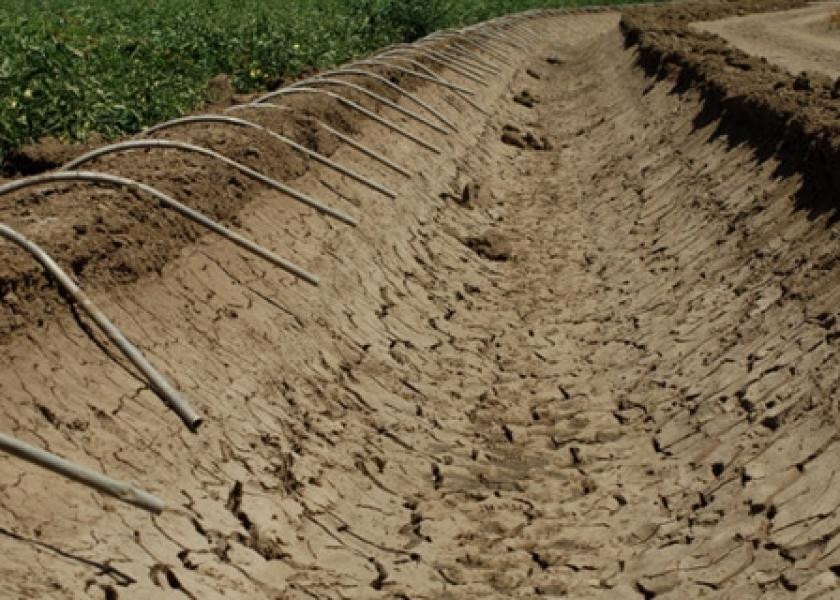Vegan DJ Moby Beefs With California Farmers Over Drought Crisis

Moby, the vegan DJ, has a beef with California farmers, and they don’t much care for him, either.
Best known for platinum records in the early 2000s that put a techno sheen on blues and soul, the 49-year-old is taking on the drought-stricken state’s $46.4 billion agriculture industry with a petition calling for restrictions on how much water farmers may use. Even with his pop-chart reign long over, Moby commands more than 1 million Twitter followers and has inserted himself in the middle of one of California’s most heated policy debates in decades.
The man born Richard Melville Hall -- a descendant of author Herman Melville whose magnum opus inspired his sobriquet -- has become a focal point. Farmers’ responses range from hostility to confusion. Some ask, “Who is Moby?” on a Facebook page devoted to debunking arguments from a man best known for thumping, computerized beats and ambient sound squiggles.
“Our state is in a real crisis,” Moby, who moved to Los Angeles from New York in 2010, said in a statement announcing the campaign. “Let’s not kid ourselves about the real problem and the real solution. Corporate agribusinesses use 80 percent of our water. Not individuals. Not family farmers. But corporations. It is far past time that we hold them accountable and for them to be part of the solution, not the problem.”
In an interview with Rolling Stone magazine in May, Moby suggested that farmers should pay more for water, and that thirstier crops such as alfalfa, beef, almonds and cotton might need to be stricken from California. He said he’s cut back on his own water use, though he said changing residential consumption is “relatively pointless” unless farmers follow suit.
The California Farm Water Coalition, a Sacramento nonprofit representing agricultural interests, is pushing back. Some crops are suited only to California’s climate, while Moby is wrong in saying agriculture uses 80 percent of the water supply, the group said in a statement on its website. The real number, factoring in discharges to rivers and other environmental uses, is about 40 percent, the coalition said.
Moby Who?
Moby’s comments haven’t really influenced public opinion, said Mike Wade, the farm group’s executive director. He counts himself in the “Who’s Moby?” crowd.
“This gave us an opening to correct some of the misconceptions that he and others have put out there,” Wade said in a telephone interview.
Eddie Kurtz, executive director of the Courage Campaign, the Los Angeles-based nonprofit sponsoring Moby’s petition, said in an e-mail it has gathered 14,248 signatures.
The DJ’s L.A.-based public-relations firm, Kraft-Engel Management, didn’t respond to a request for an interview.
The state’s farmers have about a third less water this year than normal, according to a June 2 study by researchers at the University of California at Davis, and face direct losses of $1.8 billion. California’s economy could lose $2.7 billion from the direct and indirect consequences of the four-year drought’s effect on agriculture, the study found.
Moby’s 1999 album “Play” sold 12 million copies. He’s since released records to declining sales, while channeling his role as a vegan activist to a social media following that includes 1.3 million people on Twitter. His feed includes links to web pages about animal rights, climate change, a picture of a sloth in a spacesuit and observations such as “it takes 400 pounds of grain to make 400 pounds of bread or 1 lb. of beef. which is a better use of resources?”
Policy Suggestions
Peter Gleick, president of the Pacific Institute in Oakland, California, which examines water policy, isn’t familiar with Moby as an artist or an activist.
He said Moby’s comments, whatever their merit as policy suggestions, are part of an intensifying rhetoric as the drought persists.
“One of the things the drought has really brought out is a lot of finger-pointing,” Gleick said. “There are many divides in California water politics: north versus south, urban versus rural, the coast, farmers, environmentalists who care about fish versus environmentalists who care about air quality.”
Moby’s fans include Los Angeles Mayor Eric Garcetti, with whom Moby has performed on stage, but not Governor Jerry Brown, whom Moby accuses of favoring farmers.
Brown, for his part, isn’t taking the bait. Answering a question after an event on climate change in Los Angeles on Monday, the Democratic governor said farmers, like most Californians, have made sacrifices.
“We’re all in it together,” he said.







